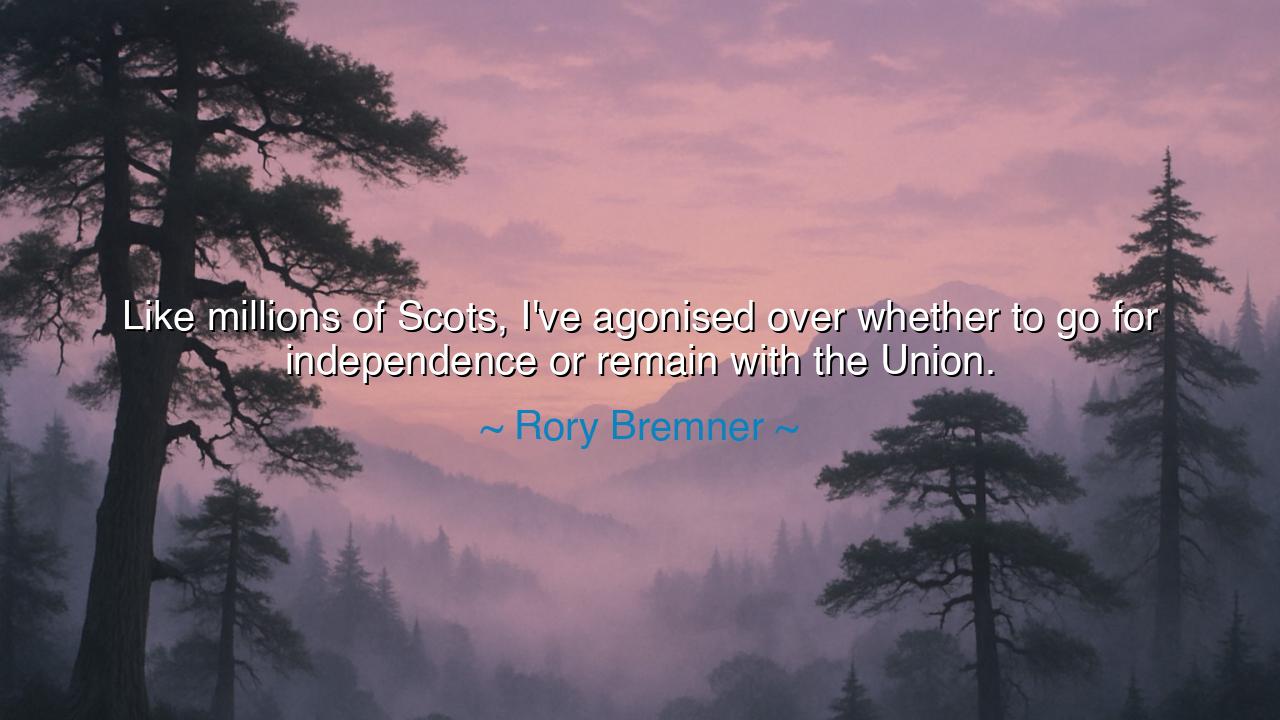
Like millions of Scots, I've agonised over whether to go for
Like millions of Scots, I've agonised over whether to go for independence or remain with the Union.






"Like millions of Scots, I've agonised over whether to go for independence or remain with the Union." – Rory Bremner
Listen, O seeker of understanding, to the voice of Rory Bremner, the Scottish satirist and thinker, who speaks here not as a jester, but as a son of his land — torn, as many have been, between the call of independence and the bond of union. His words, though plain, are steeped in the emotion of centuries. For this is not the cry of one man alone, but of a people wrestling with their history, their pride, and their future. He confesses to agonising, and in that single word lies the heart of Scotland’s struggle — not hatred, not division, but a deep and earnest searching of the soul.
The meaning of his reflection lies in its universality: it is the confession of all who have stood between loyalty to the past and hope for what might yet come. To “agonise” is not weakness — it is the mark of conscience, the pain of one who loves too deeply to choose lightly. For Scotland is not merely a land of hills and glens; it is a nation of memory, of poets and warriors, of unity and yearning. The question of whether to “go for independence or remain with the Union” is not simply political — it is spiritual. It is the question of identity itself: who are we, and who shall we become?
The origin of Bremner’s words lies in the great debate that has defined modern Scotland: the Scottish Independence Referendum of 2014. For years, the question of sovereignty had lingered like mist upon the Highlands, and in that year it condensed into a single moment of choice. Families, friends, and neighbors found themselves divided not by bitterness, but by uncertainty — by love for their country expressed in two different visions of its destiny. Bremner, in his honesty, gave voice to the struggle of millions who felt both sides calling them. For the Union, forged over three centuries with England, Wales, and Northern Ireland, had brought strength, stability, and shared history. Yet the yearning for independence, the dream of self-determination, spoke to Scotland’s ancient spirit — the same spirit that had once followed Wallace and Bruce through blood and fire.
In his confession, we see the echo of other nations and ages. Recall the American colonies in the 1770s, who too agonised over loyalty to their crown or the birth of a new freedom. Many were torn — merchants fearing ruin, farmers fearing war — yet they could not ignore the call of self-rule. Likewise, in India, Mahatma Gandhi urged independence from Britain not through hatred, but through conviction born of love and dignity. Such struggles reveal a universal truth: that freedom and unity are both noble, but cannot always dwell together. When the heart is divided between belonging and becoming, pain is inevitable — and from that pain, nations are reborn.
But Bremner’s words also hold a gentleness rare in times of conflict. He speaks not with anger, but with empathy. He acknowledges that millions of Scots share his turmoil — that the question of independence cannot be answered by slogans or shouting, but by reflection and respect. This humility is itself a lesson: that the destiny of a people must be shaped not through scorn of the other, but through the patient weighing of love and reason. In his tone, there is no bitterness toward those who think differently — only recognition of the shared burden of decision.
Thus, the lesson is not only political, but personal. When faced with great choices — in life, in faith, in nationhood — do not flee from the agonising, for it is proof of care. The easy choice is seldom the right one; the true choice demands that we wrestle with our loyalties and our fears. And in the end, whether we choose to remain or to go, let our decision be born of truth and not of spite, of hope and not of despair. For the mark of a mature people is not the certainty of their decision, but the sincerity of their deliberation.
So, let Bremner’s words stand as a testament to the dignity of doubt. Independence may yet come, or the Union may endure — but whatever path Scotland walks, may it be guided by reflection, not rage; by compassion, not pride. For in the struggle to define themselves, the Scots have already proven their greatness. They have shown that true patriotism is not in the shouting of certainty, but in the quiet courage to question. And in that questioning — in that agonising — lies the eternal heartbeat of a people who will never cease to seek what is right, and who will always walk, with head high, beneath the sky of freedom.






AAdministratorAdministrator
Welcome, honored guests. Please leave a comment, we will respond soon